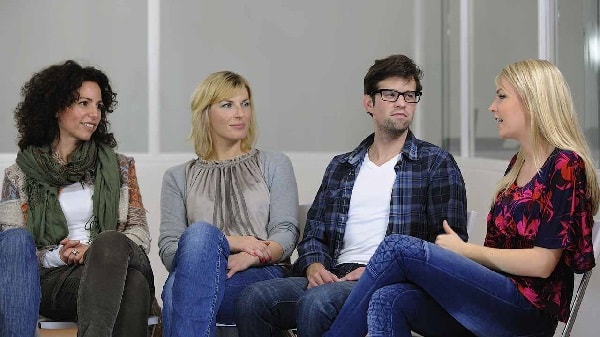Hello ladies and gentlemen. My name is Anton Sergeevich Pomazkin. I AM NS practitioner sychologist, clinical psychologist, neuropsychologist, pathopsychologist, supervisor, testing specialist, certified psychoanalytic psychotherapist, member of the Consolidated Psychoanalytic Society (Russia), member of the International Society of Catatim Experience of Images and Imaginative Methods in Psychotherapy and Psychology (Germany). Specialist of the children's center for rehabilitation, psychological correction and mental development for children with OHR, DPD, autism, Down syndrome and schizophrenia. Author of popular science articles. Co-author, expert and editor-in-chief of the Internet portal "Psyche-Market.Ru". Author and presenter of educational seminars and trainings for adolescents and adults.
You may want to consider training if you are. Interested in psychotherapy, counseling, personal development, professional development, or improving communication and relationship skills, both professionally and personally. Two days Introductory course: Understanding the Human Personality - available throughout the year.
Part-time, flexible, weekend, psychotherapy and counseling training. There are two main parallel study groups. To receive additional information upload your document. The application process for the Basic Psychotherapy Study Program is the same for Certificate and Diploma.
For the past few years, I have been providing psychological assistance to people in solving their psychological problems... Many years of constant practice, along with a good education, helps me to provide people in any, even the most difficult life situation, with highly qualified help from a psychologist.
In my work, I use only modern psychoanalytic tools such as the method of Katatimna - Imaginative psychotherapy, in other words "Symboldrama", which turned out to be clinically highly effective in short-term therapy of neuroses and clients with psychosomatic diseases, as well as for disorders associated with neurotic personality development. This method, developed by the famous German psychotherapist Professor Hanskarl Leiner, is widespread and officially recognized by the health insurance system in a number of European countries.
Each year of the curriculum is paid for during that academic year - you enroll only for each individual year at a time, and you can exit at the end of any academic year. If you are attending for 4 years, then the annual fees per year are paid during that academic year in parallel with the tuition you receive. Fees are subject to annual review.
Andrey Tatarsky, PhD, Director and Jennifer Talley, PhD, Assistant Director
Integrative Harm Reduction Psychotherapy is the treatment of people who are struggling with addiction and risk behaviors, trauma, and other mental health problems. This three-day intense workout will explore the ongoing scientific revolution in addiction treatment. This is to move away from a disease model to a psychobiosocial process model to understand addiction and move from an absence-based approach to an integral approach to treatment. There will be skill demonstrations and participants will have the opportunity to practice during the role play.
I believe that prevention of mental (mental) health is necessary for everyone. And also that it is normal to go in for sports, and it is natural to consult a psychologist!
And today I am glad to present to you a number of special professional services provided by me for psychologists, psychotherapists, psychiatrists, teachers and other professions related to communication between people:
Participants are encouraged to bring material material and clinical questions to the training. Therapeutic alliance skills as targeted agent skills and strategies for change. Evaluation as treatment Embracing ambivalence goals Individual planning for change. We highly recommend that you attend all three days. If you can only attend one or two dates, select the appropriate ticket type and indicate which dates you will be attending.
We recognize the importance of a balanced learning not only between psychological and biological therapy, but also between traditional psychoanalytic therapy and new empirical therapies. We believe that every inhabitant should master the tools of cognitive behavioral, dialectical behavior and interpersonal therapies, as well as established psychodynamic therapy. We provide a great learning experience and ample opportunity to practice each of these therapies. In fact, few other programs provide the breadth of psychotherapy training at the University of Michigan.
 Every psychologist, psychotherapist and psychiatrist before starting his professional activity, and also in the process of work you need to go through your personal therapy, i.e. solve their problems with the assistance of an experienced professional, psychoanalyst. Moreover, the experience of personal therapy is important because you, like any person, have "white spots" in your personality: unrecognized, unconscious anxieties, fears and internal conflicts.
Every psychologist, psychotherapist and psychiatrist before starting his professional activity, and also in the process of work you need to go through your personal therapy, i.e. solve their problems with the assistance of an experienced professional, psychoanalyst. Moreover, the experience of personal therapy is important because you, like any person, have "white spots" in your personality: unrecognized, unconscious anxieties, fears and internal conflicts.
Psychoanalytic psychotherapy
Residents receive didactics, observation, and clinical experience in each of these therapies, often in conjunction with outpatient clinic appointments. Upon completion of the training, residents are well equipped to independently work with each of these therapies. This combination of interventions provides a strong theoretical framework, ample opportunity for case discussion and longitudinal impact of the clinical experience of psychoanalytic therapy.
The Department of Psychiatry works closely with the Michigan Psychoanalytic Institute, which provides faculty supervision, didactic training, and enrichment workshops for residents. In addition, the program provides both time and funding for residents to participate in the Institute's seminars and programs.
It is very useful for each counselor and therapist to observe self-observation under the supervision of another professional over the experience of such significant events in life as love, sex, violence, family relationships, power, death, etc. This does not mean that the personality of the consultant should be "taken apart". This refers to the need for sufficient self-understanding before real psychological help is needed. Nevertheless, it would be too extreme to say that, when starting counseling, one should get rid of all internal conflicts. It is important to understand the nature of conflicts and how they affect the relationship with your customers. After all, if a practicing psychologist or psychotherapist in his personal life can hardly restrain anger or does not understand why he constantly feels guilty, then there is a high probability of similar reactions in the process psychological counseling... If a psychologist or even a psychiatrist is oppressed by the burden of past delusions or pressing concerns, how can he help the client get rid of such problems? In fact, he will not go further with the client than the path he has traveled.
What is the maximum workout you can find on a limited time and budget? A good place to start is the many excellent master therapists available on the site that are free to read. Instead of going to the conference, try buying audio recording of the conference instead. Plus, you can experience each training session at the conference, which is more than you would get if you went in person. She also noted that conducting audio training makes it easier to refer to it when writing or teaching. A free way to improve your learning is to film your own therapy sessions and review them later. There is nothing better than getting an edited look at your work to improve efficiency. In addition, many advisory groups are free to join, or you can start your own. All past conversations on both podcasts are available for download. Check with your local library to see if they can order psychotherapy books or videos through their national link system. Join the mailing list related to your specialties. Many mailing lists have fascinating ongoing discussions about the theory and technique of psychotherapy. Check out great psychological blogs. You save on airfare and hotel costs and keep your weekend away! ... Psychologists recently co-taught a five-day course at the Shanghai Mental Health Center of Jiaotong School of Medicine.
Personal psychotherapy with a psychoanalyst colleague is also valuable before starting a professional career, since constant encounters with various client problems often reveal your old conflicts, repressed feelings. A beginning consultant will often be tormented by a sense of professional powerlessness. This also requires some help from colleagues. Another important advantage of personal psychotherapy is that the counselor enters into the client's role and gains experience. According to A. Storr (1980), "a doctor approaches perfection if he was also a patient." A.P. Chekhov, a doctor by training, said that if he taught students medicine, he would devote half of his time to mastering the psychology of a sick person, his attitude.
Thomas is the Department of Trauma and Problem Studies at New York University's Psychotherapy and Psychoanalysis Program. Both recently taught a 5-day course at the Shanghai Mental Health Center of Jiaotong School of Medicine. China estimates there are 16 million people in need of psychiatric care not having enough qualified specialists to provide it. Mental health services in China are provided through a combination of public and private services.
Today, personal psychotherapy presents you with a unique opportunity to see the process of counseling and psychotherapy through the eyes of a client. Only in this way can you find out what anxiety associated with introspection is and what displacement is and how it works and go through your personal psychoanalysis, etc. Having been in the role of a client, you will have a much better idea of the whole range of emotional experiences that arise during psychological counseling and psychotherapy. Therefore, you need to call me now and sign up for personal psychotherapy for a specialist.
The public service includes hospital clinics, while private services include private clinics or, less commonly, psychiatrists and what will be described in US terms as master-level psychologists offering services in their private offices. Xu Yong, director of training and education at the Shanghai Mental Health Center, coordinated a successful program to expand the number of psychiatrists, psychologists and counselors who can lead psychotherapy teams. Briefly summarizing the particular problems that doctors in China currently face, he says.
2. Supervision for psychologists and psychotherapists
 First of all, I want to say about supervision that it gives you the opportunity to get a professional YOUR PSYCHOLOGIST from outside for your psychotherapeutic work, to understand the complexities of transference and countertransference and to see the projective identification of your client.
First of all, I want to say about supervision that it gives you the opportunity to get a professional YOUR PSYCHOLOGIST from outside for your psychotherapeutic work, to understand the complexities of transference and countertransference and to see the projective identification of your client.
Many young people are now torn between conformity and autonomy. These social changes took place in the context of displacement interpersonal relationships in China, the impact on the inner worlds of people and inevitably, challenging the ability of the people's ego to adapt to new realities. It is not hard to see why so many Chinese people now experience anxiety and depression. A group of psychotherapists is a great place where people can share their deep feelings of isolation, helplessness and uncertainty, explore and know their inner world and others, and learn how to communicate better.
Because thanks to supervision, you, as a practitioner or psychotherapist, have more inner mental space for thinking about hypotheses and the process of psychotherapy. Also, as a supervisor, I will help you overcome the impasse in psychotherapy. Supervision in Moscow is quite accessible and helps the psychologist, psychotherapist to develop professionally and improve their analytical capabilities in psychological assistance people. Moreover, on the one hand, it is a form of mediated assistance to the client, and on the other hand, it is a form of support for the psychotherapist himself.
As we do not have enough qualified psychotherapists to meet our counseling and psychotherapy needs, group treatment becomes even more important. Tasks included treatment planning, member selection, maintaining safety, monitoring progress, addressing transference and countertransference, and termination. Many members are now preparing to create or expand groups in their clinics, hospitals or schools. The training content was extensive, covering topics such as patient selection and preparation for groups; ethical considerations of group psychotherapists; and the group therapy process.
In our country, most of the professional communities are concentrated in Moscow. This gives the practicing psychologist and psychotherapist the breadth of the choice of the supervisor and the form of work with him. As a rule, supervision is subdivided according to areas of psychology. I work professionally in the psychoanalytic direction, and therefore if you need professional support and supervision of a psychoanalyst practitioner, then call me and sign up for supervision right now.
Bernard, Ph.D., former president of the American Psychotherapy Association Group. Bernard's illness prevented him from making the trip, and although the participants were not familiar with his work, his absence swept through the training in an atmosphere of loss and missed opportunity. “A moment in time is short” gave a sense of urgency and inspired listeners to get the most out of the collaboration.
The uniqueness of supervision or any systematic teaching in theory and practice in this regard became evident in a number of participants' responses to the trainings. Some noted that although they had been in group therapy sessions for five years or more, they never received any follow-up.
Good afternoon, dear homebodies. What is the difference psychological training from group psychotherapy? The differences between group therapy and training are enormous. The differences are expressed in many aspects.
- First of all, these are the tasks that are set for the participants and the psychologist.
- Secondly, the methods by which the audience is influenced differ.
- Third, the difference is also expressed in the sample of participants, as well as the experience of the participants themselves and the moderator.
Training is a form of group training organization, which provides for the development of theoretical and practical skills for each participant. Skills can be social, personal, and so on.
In recent years, efforts to expand group treatment have intensified in China. For example, colleagues were asked to help volunteers, who were also mental health professionals, to help the victims of the Chengdu earthquake. Recently, two new professional organizations have been established: the Association of Chinese Psychotherapists and the Advisory Association of Chinese Groups, which held its first meeting in Beijing in May this year, which was attended by 400 people.
Group psychotherapy videos
Training and the exchange of ideas are high on the agendas of these associations. While it is clear that remarkable progress has been made with regard to group psychotherapy, we believe that there is still a lot of work to be done. While the need is great and there is great interest in organizing intercultural training, funding is difficult to find. Global public health officials and nongovernmental organizations have only recently turned their attention to the need for mental health and much more commitment is required.
Psychotherapy - measures aimed at treating pathologies of a psychological nature by direct or indirect impact on the human psyche.
Psychocorrection - measures aimed at restoring the norm according to certain mental indicators.
Learning is a process aimed at acquiring theoretical and practical skills and abilities from group members or an individual.
"Mental Health Law is Suitable for China." A training program recognized by the National Accreditation Commission for Clinical Psychologists, which allows trainee supervisors to develop the necessary competencies to help supervised find their own therapeutic style and achieve adequate clinical effectiveness... Therapists receive the necessary training to broaden their clinical perspective and implement intervention strategies that involve significant change in people's problems.
Many years ago it was believed that if therapists were subjected to clinical practice long enough, they automatically acquired the skills necessary for their clinical effectiveness. Over the course of several decades, research has shown that this is not necessarily the case, and that to do this, practice must be accompanied by constant feedback and reflection, which is possible in a control space.
Differences between training and psychotherapy group in terms of goals
The goal of the training is usually clearly defined and aimed at the formation or improvement of social skills and abilities in a particular area. The goal of the psychotherapeutic group is to reduce the severity of certain symptoms in the participants, as well as to transform the personality of the participants in the psychotherapeutic group.
Global, after all, is expressed in a change in character. It can also differ for different groups of people.
Simply put, on the surface, the goal of learning is to bring everyone to the same outcome. Thus, the training is more like a regular school lesson.
The goal of group therapy is expressed in the desire to lead everyone to the fulfillment of their individual goals. In this case, all vectors of the participants' interaction with their problems during training are directed to one point, and during psychotherapy - to several. And often they may not intersect at all.
Differences in working method
Usually in training all methods of work are structured. Usually, during the training, the leader takes an active position and gives instructions to the participants, makes them perform tasks aimed at them. The coach is also responsible for the results.
When group psychotherapy is underway, no recommendations are given. There is the only rule of free interaction, according to which everyone expresses what he considers necessary and interprets what is happening during the training at his own discretion, as the participant himself is comfortable doing. Simply put, training is, in most cases, the directive leadership of the group.
The directive approach means that who, if not the coach himself, knows how to act correctly and where to direct the group. The group therapist himself gives the group the opportunity to determine in which direction it should move.

A bit of clarification
To put it simply, training is a form of organizing work with groups, which is based on the anticipated final point of arrival of the participants. There are also differences in the selection of participants. as a rule, a specific area is stipulated in which the participants should develop skills. Participants with a specific problem are taken for training.
During group therapy, first of all, the characterological characteristics of the group members are taken into account, which is led by a psychologist or psychotherapist. And in the area of competence, there are differences between group psychotherapy and training. Education is completely different, oddly enough.
In the first case, you need to gain experience in conducting trainings, and in the second - supervision and management of psychotherapeutic groups.
conclusions
So let's go over the contents of this article in a nutshell to save your time and summarize.
Training differs from group psychotherapy in the form of group work. In the first case, the instructor's directives dominate. In the second, the course of work is determined by the group itself.
The vectors of group work in the case of training are conjugated, all participants move in a certain direction, and some leveling is noticeable. In the case of group psychotherapy, the goals may not intersect at all.
According to the principle of selection of participants, training differs from psychotherapy in the main selection criterion. During trainings, the main thing is the presence of a certain problem. In the case of group therapy rely solely on characterological characteristics.
We have explained how psychological training differs from group psychotherapy. Hopefully, this article has helped some clarity on this complex issue. If not, read it again and everything will become clear.
Psychological training video
Group psychotherapy videos



